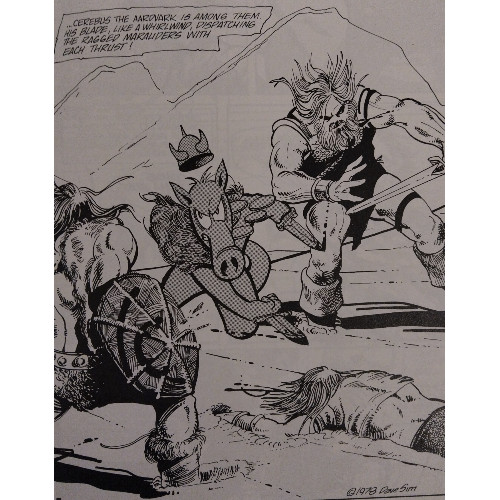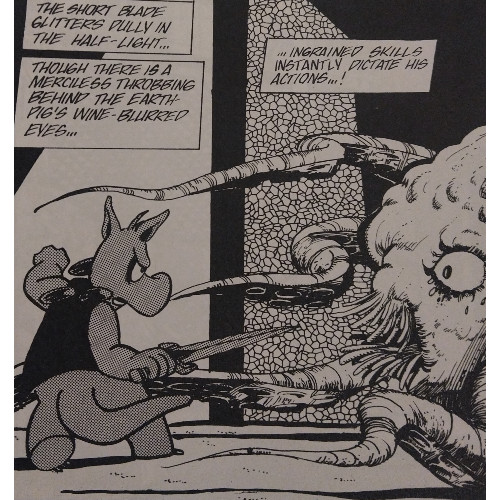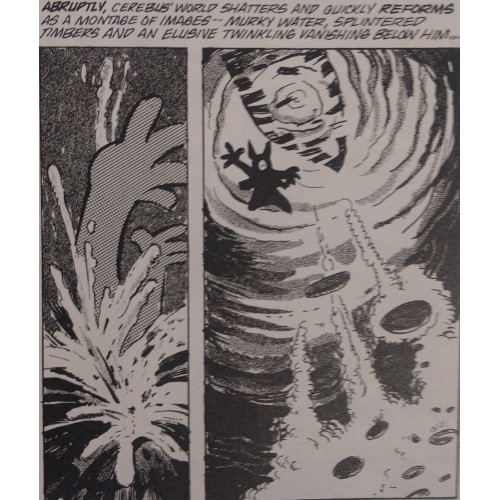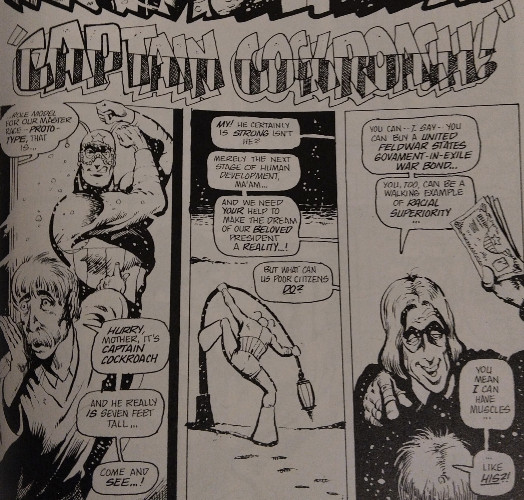Random Reviews: Cerebus
Dave Sim's first "phonebook" introduces a crafty character and showcases an artist/writer's maturing talents
—by Nathan on June 27, 2025—

Once upon a time, there was this big, burly barbarian named Conan who barbarian-ed his way through an ancient world with a big barbarian sword and fought a whole lotta bad barbarian people and rescued a whole lotta barbarian women. He's been featured in novels, a long-running Marvel Comics series, movies. The Terminator played him that one time. He also inspired several other "sword-and-sorcery" comics that pitted armed warriors against the forces of evil to protect worlds of relatively medieval means and appearances, if not lodged in more distant eras.
In the 70s, one creator decided to poke a little fun at the sword-and-sorcery genre, creating a parody around the underpinnings which governed the adventures of characters such as Conan. And what better way, Dave Sim thought, than to create a series around a character as far as physically distant from Conan as possible. Short, gray, maybe a bit hairier. And, oh, he's an aardvark, not a human. Snout-nosed, temperamental, ready to bite your kneecaps if he wasn't swinging a sword to cleave them through.
Thus, Cerebus was born.
Not "Cerberus," the three-headed guard dog of Hades from Greek mythology which the stubby sword-swinger was originally intended to be named after. Cerebus. Sim shopped the comic around a few places before deciding, along with his then-girlfriend Deni Loubert, to start their own publishing company to release this black-and-white fantasy series. Together, they created Aardvark-Vanaheim to peddle Sim's series to the masses. The independent comic creator/publisher/marker was a burgeoning business when Sim started, but as individual comic retailers expanded and developed a "direct market" option mainly for independent creators (though the "Big Two" would eventually glom on, with DC publishing series such as Untold Legend of the Batman and Marvel debuting their first oversized graphic novel through the platform), the notion of popular narratives produced by creators not associated with a big publisher began to take hold. Thanks to the direct market, we got Art Spiegelman's Maus, Richard and Wendy Pini's Elfquest, and Jeff Smith's Bone.
I've enjoyed examining some of these independently published narratives recently, watching how a different sector of the comics publishing world steered itself away from your mainstream superhero stories. Sim is a key figure in the industry, notable not only for developing Cerebus but also the means by which he bundled issues of his series together: his "phonebook" method predates popular, packaged volumes of comics such as Marvel's Masterworks and DC's Showcase collections. The man has faced controversy in his time–sales of Cerebus plummeted in the 90s after one particularly infamous issue, which we may at some point examine–but he reached his goal: publishing 300 issues of Cerebus, thus completing his epic series.
I hope to, periodically (and I'll say nothing more specific than that), post a review of the Cerebus "phonebooks" I've collected, beginning with the very first volume, gathering the first twenty-five issues of Sim's series. This volume invites us into the world where Sim's series exists…but we will quickly find it does not necessarily set a precedent for what comes after.
Cerebus
Writer: Dave Sim
Penciler: Dave Sim
Inker: Dave Sim
Letterer: Dave Sim
Issues: Cerebus the Aardvark #1-25
Volume Publication Date: December 2016 (latest printing)
Issue Publication Dates: December 1977, February 1978, April 1978, June 1978, August 1978, October 1978, December 1978, February 1979, April 1979, June 1979, August 1979, October 1979, December 1979, March 1980-February 1981
Publisher: Aardvark-Vanaheim, Inc.

Those readers aware of Cerebus may understand what the series grew into–a fierce satire aimed at politics, religion, and gender equality. Those changes came with the introduction of Sim's second arc, "High Society." With these first twenty-five issues, however, Sim is merely laying a foundation, establishing the parody style elements which eventually gave rise to the deeper satirical tone the series is (in)famous for.
These issues are, rather amazingly, quite distant tonally from what Sim would generate beginning with "High Society." That second arc takes the series in a wildly different direction, not least of which because Sim had determined by that point to develop a 300-issue series dedicated to exploring the vagaries of its titular protagonist's life. A grandiose plot is born from "High Society," the smaller elements of which are seen through a narrative kaleidoscope here–the story shifts and winds its way along, set against the backdrop of Cerebus' wandering but offering little in the way of an overarching narrative. Sim is finding his footing, exploring just exactly what he wants this series to be, providing an early taste of the shenanigans to come.

There is very much a "by-the-month" flavor to these inaugural issues, and it makes sense that when Sim began collecting Cerebus in "phonebook" volumes, he started with "High Society." In each issue in this first collection, generally, Cerebus runs into a predicament or develops a scheme to make money off someone. Oftentimes, even his most detailed plots go awry at some stage, leaving our snout-nosed friend empty-handed more often than not. Cerebus capably and shrewdly exploits the fallible, frail mindsets of his world's simpler inhabitants, and certain statements point to hints of Sim's political/religious satire that would mark later arcs in the series, though these are generally broader criticisms made as a way for Cerebus to tout his intellectual superiority. Cerebus often feels like a genius in a world of morons, which makes his regular defeats all the more demoralizing for the little dude.
Sim's main character, though certainly a protagonist, defies the descriptor of "hero." This is Cerebus' story, and the little gray guy is one fourth-wall break away from fully realizing all these events circle around him. He's as selfish as selfish can be, always on the lookout for the next big score, constantly undermining his own endeavors, and manipulating others into doing his bidding only to leave them in the dust once he's done with them. The fact Cerebus is so rarely successful in his "get rich quick" plots is a poignant point Sim makes; though downright unlikable at several junctures, Cerebus finds his greed and malignancy towards his fellow(?) man(?) is hardly rewarded, and we're allowed to wonder how events would play out differently were Cerebus a little less heartless towards those he interacts with. To a certain extent, he invites our sympathy, not necessarily because we wish for Cerebus to get away scot-free with his ill-gotten gains, but because we can believe that with even a slight change in disposition, the self-described "Earth-Pig born" could be more content with earning less.

The world Cerebus inhabits is an odd one–medieval in nature, it is governed by conspiracy and superstition. As I already noted, Cerebus often leverages the general populace's lack of intelligence against them, feeding their superstitious religious natures to bend them to his will. You know Batman's whole "criminals are a superstitious and cowardly lot" bit? It's like that, but instead of the common crook, our protagonist tricks common folk, and instead of dressing up like a giant bat (which would still be unnaturally large at Cerebus' diminutive height), Cerebus weaves his way into various roles. He's a master manipulator, and he will get you to believe he's a soldier as much as he's a mercenary or as much as he's a political advisor to a powerful ruler. Oh, the reader does not trust him one iota–they know he's dishonest from the jump, but even that knowledge adds a unique layer of perception to the series. You wonder how long Cerebus' schemes can hold out before people start realizing he's bamboozling them.
With the brief image of a certain Dark Knight Detective in mind, I would be remiss to not mention Sim's predilection to developing parodies of existing characters–Moon Knight, Captain America, Red Sonja, Elric of Melnibone, Professor Charles Xavier, Swamp Thing, and Man-Thing are all poked at. Heck, the Professor X character is also a parody of Chris Claremont! Sim doesn't seem to feel any ill-will towards the original characters or people his parodies are based on, largely leveraging them for comedic effect. He plays into Moon Knight's dissociative identity disorder, makes the Elric parody an ineffective warrior, and gives us possibly the only Swamp Thing/Man-Thing confrontation we've ever gotten on a comic page. Who cares if it's not really Swamp Thing and Man-Thing? Actually, Sim goes one step further and has his creations–Sump Thing and Woman-Thing–fall in love. It's goofy, silly fun. Yeah, there isn't much in the way of commentary or critique, but we just haven't reached the right place yet. Just enjoy the ride.

It's also enjoyable watching Sim develop as an artist even across these first issues. Cerebus, at the start, feels very much like a character who leapt from a Looney Tunes cartoon into a fantasy world; at moments, he feels slapped onto the page rather than seamlessly incorporated into it. Around Cerebus are characters with detailed physiques, and Sim's style in this regard initially reminded me of Barry Windsor-Smith, which makes perfect sense, as Windsor-Smith illustrated many Conan comics for Marvel. But even as these issues pass, Sim alters Cerebus' design enough to make him feel more at home in the world he's created, and he softens, ever so slightly, those realistic warriors and denizens. The effect works, creating an atmosphere that is suitably realistic while preventing the idea of a talking aardvark from feeling out of place.
This first "phonebook," like its namesake, is a hefty volume, if only in size. Though the series' attitudes on life, politics, religions, etc., will ramp up relatively quickly, beginning in "High Society," Cerebus is given more inauspicious beginnings here. Sim showcases his talent not only at artistry, especially in how Cerebus and the world around him is adapted to Sim's evolving talents as these issues progress, but in developing entertaining narratives which tell a unique story while also suitably riffing off the mainstream. This volume is relatively inexpensive to find used online, so if you want to dive into the earliest adventures of the "Earth-Pig born," I suggest following your nose like a truffle hunting hog and digging up this collection.